22nd edition of the festival places special emphasis on digital technology and short form filmmaking which freed new generation of filmmakers from budgetary and technical limitations. The highlight of the result is shown in Women in the Media and Afripedia sidebar sections as well as two feature length documentaries - 100% Dakar and Stories of Our Lives. These films and filmmakers respresent the vibrant, multi-ethnic, collaborative art communities that are springing out from everywhere throughout the continent that we don't hear much about.
The Festival also put a spotlight on the modern classics of African cinema, including Kirikou and the Sorceress (1998), Mossane (1996) and last year's Oscar nominated Timbuktu.
*Read my interview with Abderramane Sissako (Timbuktu)
*Read my review of Timbuktu
Many of the filmmakers and actors will be on hand for the Q & A sessions after the screening of each film.
The quality of all 7 feature films I was able to preview here for this year's festival is quite extraordinary. For the list of the films and tickets please visit New York African Film Festival website.
The festival runs from 5/6 - 5/12 at FSLC, 5/14 - 5/17 at Maysles Cinema Institute and 5/ 22 - 5/25 at BAM Cinematek.
Cold Habour (Dir. Carey McKenzie, South Africa) *Opening Night Film
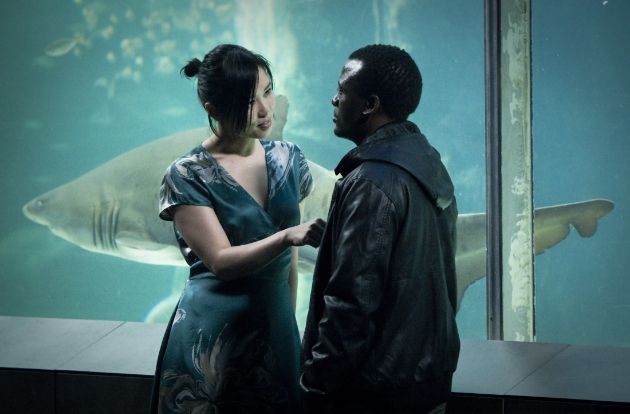
Sizwe (Tony Kgoroge) is a beat cop and an ex-soldier against apartheid. He is a hard working man, but finds himself pitted against corrupt police establishment and former comrades-turned-criminals.
While investigating the death of a Chinese triad member at the harbor, involving illegal abalone poaching and drugs, he gets a much sought after promotion as a detective. But forces behind the promotion are dictating his actions. Sizwe must play his boss, seductive Chinese triad boss (scrumptious Nan Yu) and the Specialist (underworld crime boss and his former comrade in struggle) in order to survive.
Cold Habour is a superb policier from South Africa. Moody and understated, McKenzie's cold palette is big a contrast against sunny and earthy disposition of other recent South African films. Tony Kgoroge has a real presence as a brooding cop whose loyalty is being tested in an uncertain world.
Wednesday, May 6th, 7pm (Q&A with Carey McKenzie and Tendeka Matatu) – Walter Reade Theater, FSLC
Monday, May 11th, 2pm – Elinor Bunin Munroe Film Center, FSLC
100% Dakar - More Than Art (Dir. Sandra Krampelhuber, Austria/Senegal)
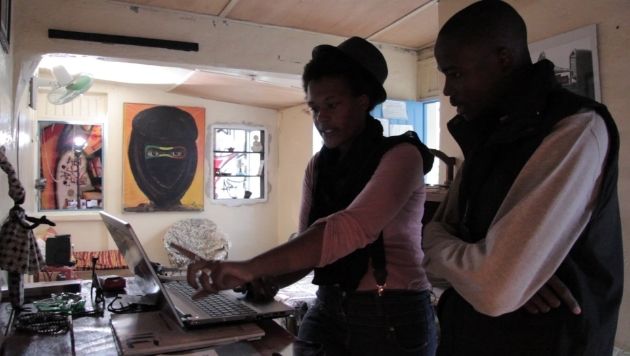
Austrian filmmaker Sandra Krampelhuber documents a booming artist community in Dakar, Senegal. These young musicians, rappers, graffiti artists, fashion designers and dancers talk about their beloved city - Dakar is where it's at. For an African artist, days of being an expat, living in Europe or America is over. As the case of many interviewees, they were educated in other parts of the world but all have decided to come back.
They are short on resources, but counting on the country's 60% population being under the age of 25, they see a great potential being just where they are.
They talk about success in collaboration. These business savvy artists seized the opportunities after historic presidential election in 2012 where corrupt incumbent prez Abdoulaye Wade lost in a landslide. The young Senegalese said goodbye to the old ways of doing things- depending their future solely in the hands of politicians and authorities. As one says in the film, 'cultural activism became much more effective than political one.'
These artists are like kids left to their own devices. They are full of enthusiasm while being practical. It's their sense of optimism that I take away the most from watching 100% Dakar. And it's a good feeling.
May 9th at 4:15pm (Q&A with Sandra Krampelhuber)
Tuesday, May 12th at 4pm – Elinor Bunin Munroe Film Center, FSLC
Love the One You Love (Jenna Cato Bass, South Africa)
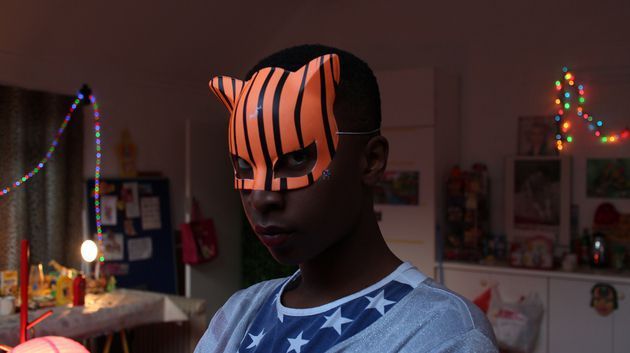
Terri (Chiedza Mhende) works as a sex phone operator and Sandile (Andile Nebulane) works at a dog shelter. They are a great couple. All their friends say so. They themselves seldom question this fact. But deep down, Terri wants more than just love. She never utters "I love you"s but receives it aplenty from Sandile. For her love is the most insidious weapon there is. There is a world out there and South Africa is too small for her.
Everyone, including a shaman and a priest, reiterates that the commitment to love is a burden- might be a light one, but all the same. Terri's indecisiveness becomes a great chasm between them.
Then there is Nelson (Nelson Da Neves), having a hard time letting go of the memories of his ex. He hangs out with the ex's younger brother and leaves the side of the bed where she used to sleep untouched, keeping his melancholy vigil of the love that got away.
A conspiracy finds its way to the two interweaving stories - Sandile is convinced that it's some kind of outer force working against their happiness. Nelson finds an undisputed fact on the internet that he and his ex are meant to be together.
First time director Jenna Cato Bass has a delicate, fluid touch in sketching out the big questions/minutia in love and relationship in multi-culti, burgeoning Johannesburg. Love the One You Love is honest depiction of a relationship that is both charming and melancholic.
Friday, May 8th, 9:00pm – Elinor Bunin Munroe Film Center, FSLC
Red Leaves (Bazi Gete, Israel) *Centerpiece Film
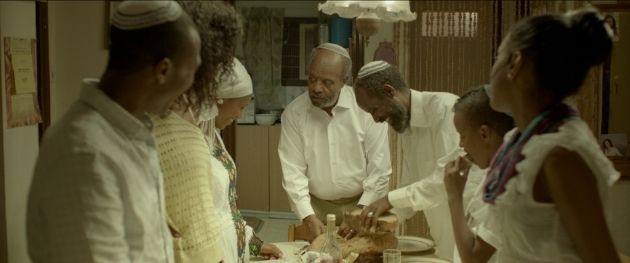
Ethiopian Israeli director Bazi Gete tells a King Lear inspired story taking place in bustling cosmopolitan city, Tel Aviv, starring non-actors. Not long after his wife's passing, an old Ethiopean-Israeli patriarch, Meseganio, announces at the shabatt dinner that he sold his apartment and that he intends to move in with one of his children. It's a shock to all three of his children, who have their own family to take care of and have gotten used to modern way of living.
Meseganio goes to his older son only to discover his daughter in-law being disrespectful and his daughter disobeying his wishes. Disgusted and upset, he leaves for his second son's house. Everything is ok at first, but soon he finds that there has been rift between his womanizing son and his long suffering wife. They fight like children in front of him and their teenage son. It is too much to bear for an old man who is a forever immigrant in a foreign country where he doesn't even speak the language.
To make matters worse, two sons decide to suggest Meseganio go to an old folks home, full of white Israeli retirees. He throws a fit, and leaves the house, only to be picked up and handcuffed by immigration services.
Red Leaves is a film that is shot like an observational documentary. Easy comparison can be made with Ozu's seminal Tokyo Story. But unlike the Japanese counterpart with its passive, aging father, Meseganio is still spirited man who is too proud to give up his old Ethiopian ways. His belligerence is treated without any sympathy. It's a harsh reality both generations have to face with head on and Gete doesn't shy away from its ugliness.
Friday, May 8th, 6:45pm (Q&A with Bazi Gete)
Sunday, May 10th, 4:15pm (Q&A with Bazi Gete) – Elinor Bunin Munroe Film Center, FSLC
The Narrow Frame of Midnight (Tala Hadid, Morocco/France/UK)
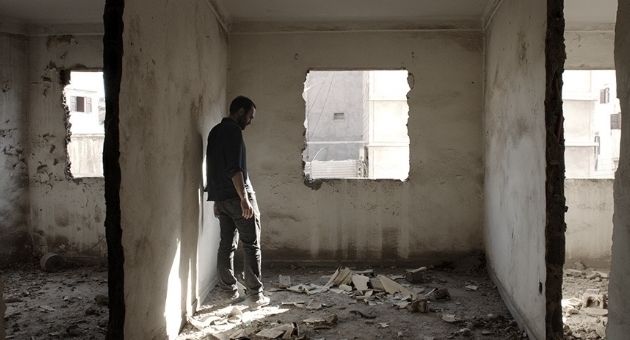
A stunningly beautiful, haunting film about displacement, memories and human connection. Moroccan-Iraqi Zacaria is on the road to find his brother, Yoseph, who went back to Iraq. Yoseph always has been the brave one, the one who had conviction.
Zacaria's path crosses with Aicha, a little girl kidnapped and sold to some Westerner sleazebag for pleasure, on route to a meeting point with her pimp and his girlfriend. She's come from a long way and wants Zacaria to take her away with him. He drops her off to his former French lover/wife Judith (Marie Josée Croze) living in remote Moroccan village. His journey takes him to Turkey then to Iraq.
Rather than long expositional dialog, director Tala Hadid relies on impregnated, poetic images and flashbacks to roughly sketch out the character's back stories. Lensed by Sokurov cinematographer Aleksandr Burov (Second Circle, Father and Son), the images and colors have real impact on understanding the violent history of the region and sorrows and loneliness of the displaced.
Monday, May 11th, 6:30pm (Q&A with Tala Hadid and Danny Glover) – Elinor Bunin Munroe Film Center, FSLC
National Diploma (Dieudo Hamadi, Democratic Republic of Congo/France)
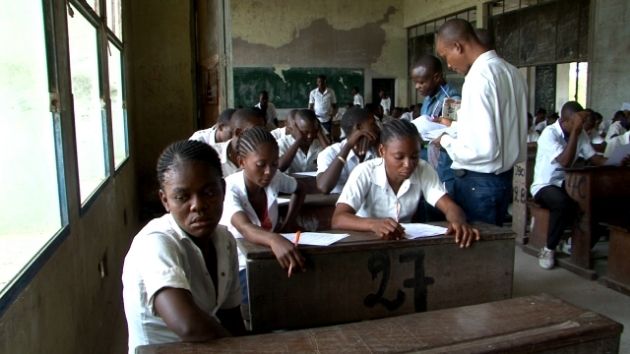
Dieudo Hamadi documents trials and tribulations of high school students in Democratic Republic of Congo as they prepare for the National Exam. It's a do or die situation for many impoverished students because without the diploma, their fate is pretty much sealed in living in poverty forever. The school year has been bad - teacher's strike left many of the students lagging behind their studies. Teachers subsist on student's fees, so unpaid students get kicked out of the classroom every morning, during the roll call. It's cutthroat like that in Kisengani. The students who can't afford, and there are many, get together, chip in a little money for marquis (common house), start living together to study day and night for two months for the exam.
It's mindblowing to see how motivated and driven they are to pass the exam. It's an intense religious affair also- a preacher at the church blesses their ball pens, a girl falls down to the floor because she is possessed by ghost of her family members who don't want her to pass the exam so she needs to be exorcised, a kid goes to see a traditional witch doctor to bless him, etc.
Corruption is rampant. There is a racket for selling leak answers to the exam and everyone talks about strategies on how to cheat. Teachers come in to their marquis, complaining how they are not getting paid.
Come the exam days - one day it's a disaster because of leaks didn't provide right answers, the next day everyone's overjoyed because the given answers were right. Two months later, there are mad celebrations on the street. Then there are heartbreaks. We talk about our education system being broken. National Diploma is an eye opening experience into an education system that has everything going against students.
Sunday, May 10th, 9:00pm – Elinor Bunin Munroe Film Center, FSLC
Run (Philippe Lacote, Ivory Coast/France)
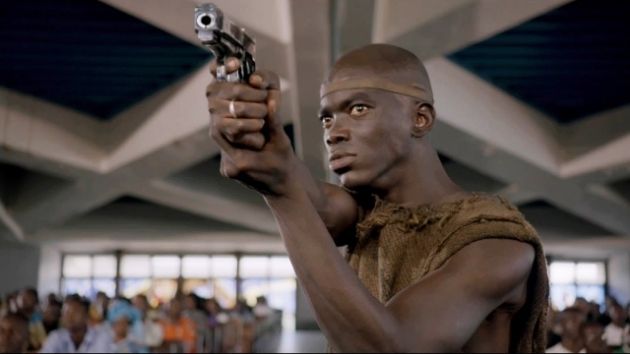
A gritty modern parable that reflects recent civil war of Ivory Coast. Run tells an orphan boy named Run (played by Abdoul Bah as a boy and later Abdoul Karim Konaté), always running away from his ever changing circumstances and changing his allegiance.
Run starts first as the rainmaker's apprentice which signifies the west African country still steeped in mysticism. It's his hand that the rainmaker has to be sacrificed but he runs away. Then runs into and becomes an assistant to 'greedy Gladys', a plump woman touring and making money off of binge eating reflecting short-lived good times and greed after the country's independence. When she can't eat no more, he denies his acquaintance to her and joins a rebel group, Young Patriots, on the street. Young 'admiral' as their leader, the rebels act as the invisible arm of the government who incites jingoistic patriotism against all foreigners. Run, again, with shifty identity, running from one situation from another out of survival, has no loyalty toward the group.
It's Assa (Isaach de Bankolé), a father figure who gives him a purpose in life by training and arming him to kill the newly minted country's Prime Minister (who happens to be Admiral of the Young Patriots) for the better future of all Ivorians. The act also corresponds with the old rainmaker's prediction in the beginning what Run is destined to do.
From it's cyclical structure to beautifully shot and edited images, Lacote's skillful filmmaking is in its highest order. Combining elements of mysticism, political intrigue, gritty urban drama, Run is hypnotic and original film artfully reflecting the beleaguered nation's complex history.
Monday, May 11th, 9:00pm (Q&A with Isaach de Bankolé) – Elinor Bunin Munroe Film Center, FSLC
No comments:
Post a Comment